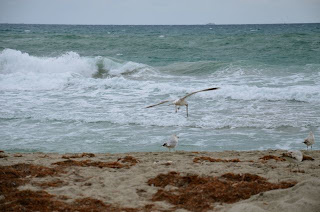Just how do we know? How do we find stuff out. Knowledge acquisition has changed over the years. Almost as fast as the knowledge itself. Let's think about this a bit. I will use a recent observation as my example.
Stick Dropping.
There I sat. The beach was almost empty. Well, empty of people, there were lots of birds, plenty of bugs and even a few lizards a ways back, behind the windbreaks. The wind was blowing. In fact, that is why the beach was almost people free. Fifteen miles an hour at least and at that speed it doesn't take too long for the flying sand to find eyes, nostrils and cameras. Eyes and nostrils can easily be cleaned, but cameras........ Anyway, the winds were brisk. If I positioned myself just right I could avoid most of the eye problems and all of the nostril issues, and hopefully the majority of camera calamities as well. The beach umbrella was out of the question, so the sun was an issue too. Isn't it amazing how we can adapt to changing conditions. How about the other beach inhabitants? This is where the information acquisition starts. Let's watch the birds in the wind. (Here is the first clue to "How we know what we know.")
 What were they doing? How did they react to a stiff breeze? Batten down. Get small. Scrunch down. Huddle together. All good strategies. The birds face into the wind and get down and close as many openings as possible. Facing into the wind smooths the feathers, away ruffles them. Get behind stuff. Get behind other birds when you huddle together. OR Just play. That's right, Play with the wind.
What were they doing? How did they react to a stiff breeze? Batten down. Get small. Scrunch down. Huddle together. All good strategies. The birds face into the wind and get down and close as many openings as possible. Facing into the wind smooths the feathers, away ruffles them. Get behind stuff. Get behind other birds when you huddle together. OR Just play. That's right, Play with the wind.Remember Jonathan Livingston Seagull--- Do gulls fly or do they just feed?
"Most gulls don’t bother to learn more than the simplest facts of flight – how to get from shore to food and back again. For most gulls, it is not flying that matters, but eating."
“Why is it,” Jonathan puzzled, “that the hardest thing in the world is to convince a bird that he is free, and that he can prove it for himself if he’d just spend a little time practicing? Why should that be so hard?”
 |
| First You Find the Right Stick |
 |
| Down It Goes |
 |
The Chase |
What is going on here? Play? Training? And how do we know. Well, that brings me back around to why I started this in the first place. How do we know what we now. We Observe (see above.) We also find out what others already know. We research. Now research has gotten very different lately. WIKIPEDIA...... Maybe. As a start. But the Internet is filled with other places to find out stuff.
What is this "stick dropping?" Or am I the first to ever see this behavior. I think not. Let's look!

The authors conclude it is PLAY. They go on to discuss the costs of play, and some of the benefits as well. If you take the benefits into account you really can't rule out training. But then again there are many behaviorists and education researchers that argue play is always a form of training. Benefits of Play Web Site
It is how we learn, how we know stuff!!!!!!
 |
| The PLAY is the thing....... |









